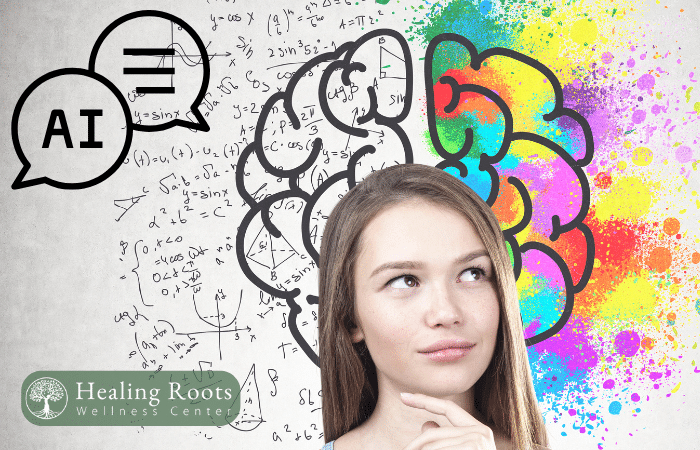
Let me let you in on a little secret—this article? It’s a team effort between me and ChatGPT. What used to take me weeks (or even months) to write now takes a fraction of the time with AI as my assistant. By summarizing insights I’ve gathered from my practice, I can share ideas and resources that help more people feel seen and supported. It’s like I’m inputting the thoughts swirling in my head, and AI helps me organize them into something coherent. For example, I can identify common themes I’ve seen, like perfectionism or overwhelm, and write something others might not even realize is widely shared. So buckle up—AI and I are teaming up to show you how this tool is helping both the people I work with (and myself) as a powerful ally in navigating challenges and unlocking new possibilities.
While AI can be a powerful tool, it’s important to be aware of its potential drawbacks. These include:
Being mindful of these risks ensures we can approach AI use with balance and responsibility.
Although AI has its risks, let’s dive into the benefits I’m seeing as a powerful tool for supporting anxious and overwhelmed minds.
In a world where decision-making often feels like navigating a minefield, tools like ChatGPT and other AI services can serve as invaluable allies, particularly for individuals with neurodivergence, anxiety, or challenges related to executive function. By offering clarity, structure, and actionable suggestions, AI helps ease the cognitive load that decision-making and planning can impose. Here, we explore the benefits and potential challenges of using AI for support, alongside relatable examples.
While the benefits are significant, it’s essential to acknowledge some challenges AI use might present:
To maximize the benefits of AI while minimizing challenges, consider these strategies:
When used thoughtfully, AI can empower anxious and overwhelmed minds to tackle tasks that previously felt insurmountable. Whether it’s overcoming perfectionism, navigating daily routines, or planning life events, AI offers a supportive tool to bridge gaps and foster independence.
It is, however, essential to balance its use with self-awareness and human support. Responsible use of AI includes understanding its limitations and ensuring it complements, rather than replaces, human insight and creativity. By taking the time to refine outputs and use AI intentionally, we can ensure the journey toward growth remains both authentic and personalized!
Disclaimer: At Healing Roots Wellness Center, we’re committed to supporting your mental well-being with professional care and guidance. The information shared in this blog is for educational and informational purposes only and is not intended as a substitute for personalized mental health support or medical advice, diagnosis, or treatment. While we are qualified mental health professionals, we do not diagnose medical conditions. If you have specific concerns about your health or well-being, we encourage you to seek advice from the appropriate healthcare provider. Healing Roots Wellness Center does not endorse any specific tests, products, procedures, or opinions mentioned in the blog. Reliance on the information provided is solely at your own risk. Remember, your mental health journey is unique, and the right support can make all the difference.
At Healing Roots Wellness Center, we’re committed to supporting your mental well-being with professional care and guidance. The information provided throughout our website – including blog posts, articles, and other content – is for educational and informational purposes only. It is not intended as a substitute for personalized mental health support or professional medical advice, diagnosis, or treatment. While we are qualified mental health professionals, we do not diagnose medical conditions. If you have specific concerns about your health or well-being, we encourage you to seek advice from the appropriate healthcare provider. Healing Roots Wellness Center does not endorse any specific tests, products, procedures, or opinions mentioned on our website. Reliance on the information provided is solely at your own risk. Remember, your mental health journey is unique, and the right support can make all the difference.
Whether you’re ready to schedule a free consultation or just have a few questions before getting started, you’re in the right place.
Pilar offers a compassionate, safe space to explore the impact of trauma, relationship wounds, anxiety, overwhelm, and the everyday pressures of life. If you’re longing for more authentic connection — with others and with yourself — this form is your first step.

Whether you’re seeking support for anxiety, chronic illness, trauma, parenting stress, or something else entirely — this is a safe and simple first step.
This short form will help us get to know what kind of care you’re looking for and match you with the best clinician for your needs. You can choose someone specific from our team or let us help place you with a therapist who aligns with your goals and preferences.
You’ll also have the chance to select the areas you’d like support with — whether that’s just one specialty or several.

